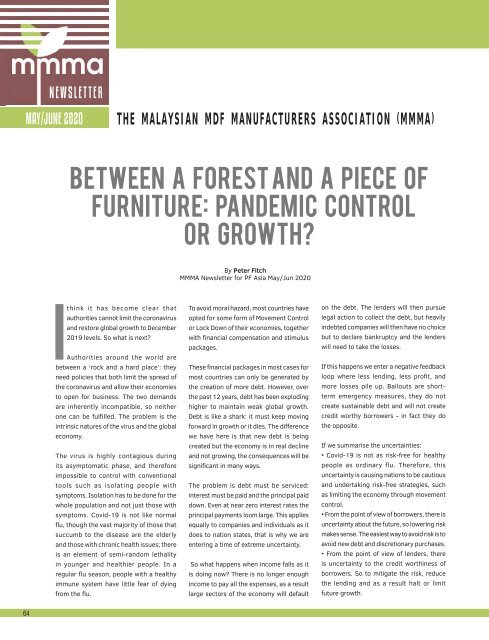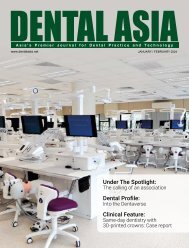Panels & Furniture Asia May/June 2020
Panels & Furniture Asia (PFA) is a leading regional trade magazine dedicated to the woodbased panel, furniture and flooring processing industry. Published bi-monthly since 2000, PFA delivers authentic journalism to cover the latest news, technology, machinery, projects, products and trade events throughout the sector. With a hardcopy and digital readership comprising manufacturers, designers and specifiers, among others, PFA is the platform of choice for connecting brands across the global woodworking landscape.
Panels & Furniture Asia (PFA) is a leading regional trade magazine dedicated to the woodbased panel, furniture and flooring processing industry. Published bi-monthly since 2000, PFA delivers authentic journalism to cover the latest news, technology, machinery, projects, products and trade events throughout the sector. With a hardcopy and digital readership comprising manufacturers, designers and specifiers, among others, PFA is the platform of choice for connecting brands across the global woodworking landscape.
Create successful ePaper yourself
Turn your PDF publications into a flip-book with our unique Google optimized e-Paper software.
NEWSLETTER<br />
MAY/JUNE <strong>2020</strong><br />
THE MALAYSIAN MDF MANUFACTURERS ASSOCIATION (MMMA)<br />
Between A Forest and A Piece of<br />
<strong>Furniture</strong>: Pandemic Control<br />
or Growth?<br />
By Peter Fitch<br />
MMMA Newsletter for PF <strong>Asia</strong> <strong>May</strong>/Jun <strong>2020</strong><br />
think it has become clear that<br />
I<br />
authorities cannot limit the coronavirus<br />
and restore global growth to December<br />
2019 levels. So what is next?<br />
Authorities around the world are<br />
between a ‘rock and a hard place’: they<br />
need policies that both limit the spread of<br />
the coronavirus and allow their economies<br />
to open for business. The two demands<br />
are inherently incompatible, so neither<br />
one can be fulfilled. The problem is the<br />
intrinsic natures of the virus and the global<br />
economy.<br />
The virus is highly contagious during<br />
its asymptomatic phase, and therefore<br />
impossible to control with conventional<br />
tools such as isolating people with<br />
symptoms. Isolation has to be done for the<br />
whole population and not just those with<br />
symptoms. Covid-19 is not like normal<br />
flu, though the vast majority of those that<br />
succumb to the disease are the elderly<br />
and those with chronic health issues; there<br />
is an element of semi-random lethality<br />
in younger and healthier people. In a<br />
regular flu season, people with a healthy<br />
immune system have little fear of dying<br />
from the flu.<br />
To avoid moral hazard, most countries have<br />
opted for some form of Movement Control<br />
or Lock Down of their economies, together<br />
with financial compensation and stimulus<br />
packages.<br />
These financial packages in most cases for<br />
most countries can only be generated by<br />
the creation of more debt. However, over<br />
the past 12 years, debt has been exploding<br />
higher to maintain weak global growth.<br />
Debt is like a shark: it must keep moving<br />
forward in growth or it dies. The difference<br />
we have here is that new debt is being<br />
created but the economy is in real decline<br />
and not growing, the consequences will be<br />
significant in many ways.<br />
The problem is debt must be serviced:<br />
interest must be paid and the principal paid<br />
down. Even at near zero interest rates the<br />
principal payments loom large. This applies<br />
equally to companies and individuals as it<br />
does to nation states, that is why we are<br />
entering a time of extreme uncertainty.<br />
So what happens when income falls as it<br />
is doing now? There is no longer enough<br />
income to pay all the expenses, as a result<br />
large sectors of the economy will default<br />
on the debt. The lenders will then pursue<br />
legal action to collect the debt, but heavily<br />
indebted companies will then have no choice<br />
but to declare bankruptcy and the lenders<br />
will need to take the losses.<br />
If this happens we enter a negative feedback<br />
loop where less lending, less profit, and<br />
more losses pile up. Bailouts are shortterm<br />
emergency measures, they do not<br />
create sustainable debt and will not create<br />
credit worthy borrowers - in fact they do<br />
the opposite.<br />
If we summarise the uncertainties:<br />
• Covid-19 is not as risk-free for healthy<br />
people as ordinary flu. Therefore, this<br />
uncertainty is causing nations to be cautious<br />
and undertaking risk-free strategies, such<br />
as limiting the economy through movement<br />
control.<br />
• From the point of view of borrowers, there is<br />
uncertainty about the future, so lowering risk<br />
makes sense. The easiest way to avoid risk is to<br />
avoid new debt and discretionary purchases.<br />
• From the point of view of lenders, there<br />
is uncertainty to the credit worthiness of<br />
borrowers. So to mitigate the risk, reduce<br />
the lending and as a result halt or limit<br />
future growth.<br />
64


















